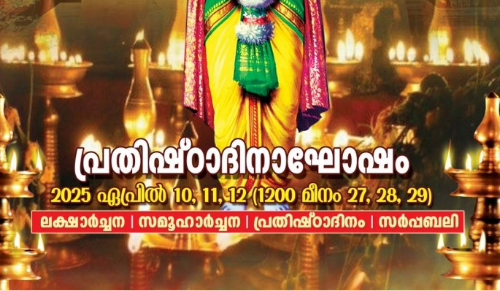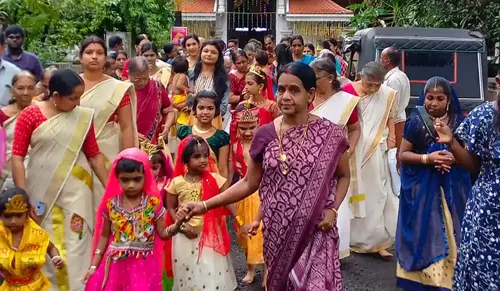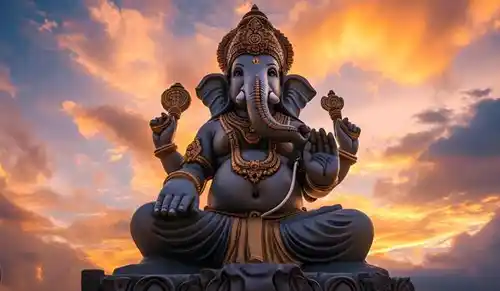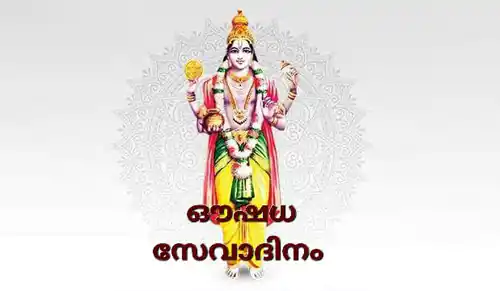
Loading

Loading

Prathishtadinam of Sree Dhanwanthari temple is being celebrated on 10, 11 and 12th of April with important poojas and celebrations. The main poojas, abhisekam and para vaipu etc are on 12th of April which will be officiated by our Thanthri, Brahmahsree Puliyannoor Krishnan Namboodiripad. In the evening there is Sarpabali.
APRIL 10
6 AM - Laksharchana
6 PM - Kalasattam ( Important to view)
6.30 PM - Deeparadhana
Then starts - Ashtapathi Kacheri by Krishnarpanam, Thrissur.
APRIL 11
5 pm - Samooharchana
6.30 PM - Nrutha Nithyangal - by Srushti - Poonkunnam
7.15 PM - Dance Programme - by Viyyur Ezhuthchan Kalakendram
7.30 PM - Thiruvathirakkali - by Thalam TSR, Sreebhadra Evannur.
APRIL 12
Thanthri Brahmasree Puliyannur Krishnan Namboodiripad will officiate
Viseshal poojas, Abhishekams, Navagam, Panchgavyam. Devotees can do para nirakkal.
9.30AM - Chathussatha nevedyam
11 AM to 1 PM - Prasad oottu
6 PM - Sarpabali -by Brahmasree Pathirakunnathu Rudran Namboodiri
6.30 PM Dance programme - By Aardra R Menon, Dhwani R Menon, JANANI Coimbathore
Important events
Laksharchana
Para Nirakkal for Sree Dhanwanthari
Para Nirakkal for Devi
Chathussatham nivedyam
Sarpabali

Ashtamirohini, or Janmashtami, is celebrated with reverence in Sri Dhanwanthari Temples, marking the birth of Lord Krishna, the eighth avatar of Lord Vishnu. The day carries unique significance as it reflects the dual blessings of Lord Krishna's divine playfulness and Dhanwanthari's healing energy. Devotees begin the day with rituals like special Abhishekam (sacred bathing) of Dhanwanthari idol, using herbal-infused water and fragrant oils, symbolizing health and purification. Traditional poojas, Krishna bhajans, and recitals of the Bhagavad Gita fill the temple, creating a spiritually uplifting atmosphere. Temples are adorned with flowers, oil lamps, while devotees prepare offerings of butter, fruits, and Ayurvedic prasadam. The highlight of the celebration is the Uriyadi (breaking of the pot), a playful event reenacting Krishna’s childhood mischief, accompanied by devotional singing and vibrant participation from the community. Special Ayurvedic health camps are often organized, promoting the temple's focus on healing, alongside spiritual well-being. This dual celebration of Krishna's divine play and Dhanwanthari's nurturing presence draws devotees seeking blessings for happiness, health, and prosperity, making the festival a unique blend of devotion and wellness.

Vinayaka Chaturthi is a significant festival celebrated in many Hindu temples, including Sri Dhanwanthari Temples. While Lord Ganesha is the primary deity honoured during Vinayaka Chaturthi, his connection to health, obstacles, and well-being makes this festival meaningful in a Dhanwanthari Temple, where the focus is on healing and health. Lord Ganesha as the Remover of Obstacles: Devotees first worship Ganesha to remove obstacles in life, including those related to health, before offering prayers to Lord Dhanwanthari. Holistic Blessings: The dual worship of Ganesha and Dhanwanthari symbolizes seeking holistic well-being—spiritual and physical health. Special Homas are performed to invoke Lord Ganesha's blessings. Offerings of herbs and Ayurvedic ingredients, aligning with the temple's focus on health and healing, are used during the homam.

Sree Dhanwanthari an incarnation of Sree Mahavishnu is the lord of Ayurveda. Ayurvedic Doctors and even Allopathy Doctors, worship Sree Dhanwanthari as their prime deity. Patients worship Sree Dhanwanthari to get their diseases cured. It is believed that those who worship Sree Dhanwanthari routinely become healthy throughout their life. The month of Karkidakam is considered as the most auspicious time to enhance one’s health. Hence 16th of Karkidakam is celebrated as the Oushadha Seva Day in our temple. On that day, Oushadham will be prepared by the Thantri by chanting special mantras like Purushasooktam, Ayurarogyasooktam to Sree Dhanwanthari and the Oushadham becomes divine to consume and it is believed that the patients get relief from their ailments by consuming it. Devotees come to temple to drink consume Oushadham by taking bath early in the morning and with empty stomach. They chant the following sloka while consuming the medicine. “Achuthananda Govinda Vishno Narayana mrutha rogan me naasayaa seshaa aasu Dhanwanthare hare” By taking the Oushadham in this traditional way, it is as good as taking the Mruthasanjeevani, the elixir of life